Christmas crisis with the moisture separator reheater (MSR) protective membranes at Kozloduy Nulcear Power Plant (NPP) 🇧🇬 Unit 6 secondary circuit
– a request for access to public information from the regulator by Dr. Petar Kardzhilov
– а comment by Prof. Georgi Kaschiev;
PRESS RELEASE
13.01.2026
The Nuclear Regulatory Agency Must Give Answers about the Christmas Crisis at Kozloduy NPP
Dr. Petar Kardzhilov, Bulgaria,
Member of Nuclear Transparency Watch
Management Board
In the second half of December (from 11 to 24.12) an unprecedented crisis in the history of the plant developed in Unit 6 of the Kozloduy NPP. Just days after the annual overhaul of the unit, safety elements – membranes, part of the secondary circuit of the unit (the steam turbine unit), ensuring safety, were damaged twice. They were damaged and replaced twice, and through internal sources we received information that they were not manufactured by the usual supplier, but by a company associated with the oligarch Hristo Kovachki, Atomenergoremont. A large column of steam rose above the Kozloduy NPP for several days, which frightened the citizens around the plant. Most media did not show the steam photos, and national broadcast television did not send teams to report at the plant and nor covered the case with extensive reports.
We have said more than once that emergency shutdowns and restarts, as well as accidental reductions and increases in the power of the units, lead to wear of the main components of the reactors, which could be a precursor for serious incidents. To date, Unit 6 operates with a reduced power of 836 MW when the design power is 1080 KW. This results in Bulgaria loosing millions from unrealised sales and imports of electricity. Detailed information about the entire Christmas crisis with the membranes of the moisture separator reheater (MSR) at the Kozloduy NPP is available in a Facebook post on the personal profile of Prof. Georgi Kaschiev (see below). Separately, I had the opportunity to comment on the case with the only journalist who invited me to do so in “Honestly Speaking with Lyuba Kulezich”: https://eurocom.bg/video/petar-kardzhilov-v-chestno-kazano-s-lyuba-kulezich-18-12-2025-god/.
According to Bulgarian law, the Nuclear Regulatory Agency (NRA) owes the public a detailed commentary, analysis and safety recommendations regarding what is happening at the Kozloduy NPP. Since they are not doing so, today I asked, in an official application under the Access to Public Information Act, seven questions regarding the Christmas crisis at our NPP to the Chairman of the NRA, Mr. Tsanko Bachiiski:
- According to the current Bulgarian legislation, as the Chairman of the NRA, you are responsible for carrying out control over the technical safety of facilities with increased danger on the territory of nuclear power plants. Please answer in detail: What control did the NRA carry out and what conclusions did you reach regarding the crisis situation at Christmas, including a series of incidents with damaged protective membranes of the MSR of the steam turbine of Unit 6, which developed from December 11 to 26, 2025?
- Why and how was it allowed not to deliver original protective membrane devices?
- Has the technical solution for implementing alternative membranes been agreed with the manufacturing plant and has it been approved by the NRA?
- What tests have been carried out with these alternative membrane devices and how has it been proven that they can ensure the safety of the MSR?
- Have the NRA issued any safety regulations? What regulations have been issued to ensure safety?
- As of today – January 13, 2026, Unit 6 is operating at a low power of 837 KW. Until when is Unit 6 expected to operate at a significantly lower power? 7. Please provide us with all available documents on the case of the damaged membranes of the separator-steam superheater of the turbine of Unit 6, including an official report from Kozloduy NPP, as well as documents regarding the origin of these consistently damaged safety elements.
The decision according to the APIA with answers to the questions must be provided within one month.
Dr. Petar Kardzhilov
*******
Chronicle of a criminal adventure
by prof. Dr. Georgi Kaschiev (a Facebook post, 02.01.2026)
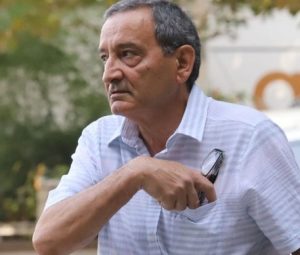 Prof. Dr. Georgi Kaschiev has over 45 years of experience in the field of nuclear reactors and the risks associated with them. During the period 1972-1989 he worked at the Kozloduy NPP as the plant’s chief physicist and scientific manager of the launch of Unit 5. He taught at the Technical University, was a senior researcher at the Institute for Risk Research at the University of Vienna and a professor of nuclear reactors at the Tokyo Institute of Technology. During the period 1997-2001 he was the chairman of the Committee for the Use of Atomic Energy for Peaceful Purposes, which was later transformed into the Bulgarian Nuclear Regulatory Agency.
Prof. Dr. Georgi Kaschiev has over 45 years of experience in the field of nuclear reactors and the risks associated with them. During the period 1972-1989 he worked at the Kozloduy NPP as the plant’s chief physicist and scientific manager of the launch of Unit 5. He taught at the Technical University, was a senior researcher at the Institute for Risk Research at the University of Vienna and a professor of nuclear reactors at the Tokyo Institute of Technology. During the period 1997-2001 he was the chairman of the Committee for the Use of Atomic Energy for Peaceful Purposes, which was later transformed into the Bulgarian Nuclear Regulatory Agency.
During the annual maintenance of the 6th unit of the Kozloduy NPP in November, 2025, the 4 protective membrane devices (so-called rupture disks) that protect the moisture separator reheater (MSR) of the steam turbine installation in case of excess pressure had to be replaced according to schedule. After a tender, a contract for their supply from the usual Russian supplier was signed in the fall of 2024. Approval (derogation) from the Council of Ministers was required, but the Ministers of Energy Vladimir Malinov and Zhecho Stankov prevented adoption of the relevant decision. The derogation comes after a full 7 (seven) months(!) in May 2025. During this time, talks are being held with Atomenergoremont, which could develop “alternative” membrane devices. As is known, this company is associated with an infamous energy “consultant” (in fact this is the notorious oligarch Hristo Kovachki – note: P. Kardzhilov). When obtaining the derogation, it turns out that the price of delivery from Russia is already higher. This gives the heads of the NPP an opportunity to make a decision to develop and implement alternative safety devices. So, why shouldn’t the “right” company take a million or more? Moreover, this enables it to establish itself as a manufacturer of equipment for NPPs. No doubt, the decision was coordinated with the management of the Bulgarian Energy Holding (BEH) and the Ministry of Energy (ME) (these institutions are the principal owners of the Kozloduy NPP according to Bulgarian law – note: P. Kardzhilov).
Some clarifications
According to regulatory requirements and good practice, however, such a decision cannot be made solely by the operator, but only after coordination with the designer and the manufacturer of the turbine. There is no information that this has been done. It turns out that the “right” company does not have the material from which the original devices are made. Therefore, a metal is chosen that, according to some specialists, has few common qualities with the original. The “innovators” also do not have accurate information about the membrane production technology and they are made using an unapproved (Bulgarianized) technology. The manufacturer does not have the opportunity to test the alternative devices at operating parameters in the MSR. Therefore, there is no evidence that the Bulgarianized devices will fulfill their safety functions, which does not bother anyone. Formally, the technical decision for their implementation was signed on December 8, 2025, long after their installation. There is information that the alternative membrane devices turned out to be more expensive than the original ones.
The cascading internal crisis situation
After the annual maintenance was completed, Unit 6 was included in the energy system on December 1 afternoon. On December 4, around noon, it was already operating at a capacity of nearly 1,000 MW and remained at this level for the following days. After about 10 days, the consequences of the criminal adventure were already apparent – one of the installed membranes tore and a strong steam leak appeared. This probably happened on December 11 afternoon, when the unit’s power dropped by about 15 MW due to the reduced flow of steam to the low-pressure cylinders of the turbine. There was no announcement of what happened, despite the column of steam being visible from afar above the turbine hall and calls from worried citizens. (The large steam leak from Unit 6 has been visible for days. The photo was taken from the town of Kozloduy by a plant employee – note: P. Kardzhilov). The unit continued to operate at this level and it was only on December 14 that it was decided to stop for repairs. The reduction in its power began on the night of December 15. According to the available information, all 4 safety devices were replaced during the repair.
On December 16, around noon, the unit was connected to the electricity grid and over the next 60 hours, its power increased very slowly. On December 19, at night, it was already operating at a power of nearly 1,000 MW when a leak was again detected in one of the membranes. The next day, leaks were detected in two more membranes, which again necessitated the shutdown of the unit. On December 21, the power began to decrease. At 9 a.m. the unit was shut down and repairs were carried out on the repair of the repair for about 75 hours. There is no information whether changes were made to the design of the safety devices. On December 24, around 11 a.m., the unit started up and on the night of December 26, the power reached about 805 MW. In the following days, it has remained at the same level (today, January 13, the capacity is 837 MW – note: P. Kardzhilov). There is no explanation as to who made this decision and why, and for how long the reactor will operate like this. The likely explanation is fear that the membranes will rupture again at a higher power.
A vicious trend of lack of transparency
This case confirmed the tendency of the management of the NPP, BEH and ME to cover up or simply remain silent about mistakes and failures and to give explanations only if they are pressed to the wall. According to Bulgarian law, the Nuclear Regulatory Agency is responsible for monitoring and informing the public, but to date its chairman has not made a detailed statement about the causes of the crisis situation in December. According to information from internal sources, after the failures, spare membrane devices were sent to two scientific organisations where they were to undergo analysis and verification. There is no information about which organisations these are, whether they have expertise in this area, what analyses they will do. The question remains of what value their conclusions and recommendations will have is a separate one.
Consequences from the adventure with the Bulgarianized safety devices
Two additional thermal cycles of power reduction from close to nominal to almost zero and back to increase were implemented.
– Consequences for the fuel: The temperature in the center of the ceramic fuel pellets from nearly 2000 °C at full power drops to about 290 °C with a subsequent increase. New defects appear in the pellets and in the shells of the heat-releasing elements, and existing ones grow. Over time, this can lead to the release of radioactive gases and easily mobile radioactive elements into the coolant.
– Consequences for thick-walled components: The decrease in the temperatures of the upper part of the reactor vessel, hot pipes and steam generators by more than 30 degrees and the subsequent increase leads to the appearance of new defects in the metal and to the growth of already existing ones, as well as to metal “fatigue”. In addition, in 2025, Unit 6 also experienced two major thermal cycles with the reactor shutdown from a high power level to zero with cooling below 100 °C and subsequent heating to nominal parameters and power increase. One of them was to conduct an emergency test and repair of the heat exchange tubes of the 3rd steam generator, a problem that the incompetent management of the NPP has not been able to solve for several years. In previous years, there were also two major cycles. The number of all types of thermal cycles is limited and this is explicitly stated in the reactor installation passport. To put it more clearly, the additional thermal cycles in 2025 and the previous two years have “eaten up” part of the life of the main equipment and its residual resource will end before 2051, especially if the adventures continue.
– Additional thermal cycles have also had an adverse impact on the heat exchange tubes in the 3rd steam generator and the defects in them have increased.
– Power changes lead to transient processes in the reactor and its management requires changes in the concentration of the soluble neutron absorber, which is done through water exchange in the primary circuit and leads to the generation of additional amounts of liquid radioactive waste.
– Financial losses.For December 2025 alone, this adventure has led to unrealized revenues (losses) of the order of over twenty minion euro. At an average market price of electricity of 100 € /MWh, each day during which the reactor is stopped leads to losses of nearly € 2,55 million. When operating at a capacity of about 805 MW, instead of about 1060 MW, the losses are nearly half a million euros per day. Since December 26, 2025, Kozloduy NPP has generated about 1,855 MW, while at the end of December 2021 and 2022, the plant generated over 2,160 MW.
In October 2023, the unjustified changes in the management of the NPP, BEH and ME with incompetent but obedient people began. Due to incompetent management, the NPP’s electricity production has been decreasing over the past three years. The expected generation for 2025 is probably below 15.4 TWh, less by over 0.4 TWh in 2024. For reference, in the period 2020 – 2022, the NPP produced 16.5 – 16.6 TWh annually. At the same time, the inherent costs of electricity production have been increasing sharply over the past three years. This leads to a deterioration in technical and economic indicators, lower revenues for the power plant, higher cost of electricity and lower revenues in the specialized funds, as well as in the Power System Security Fund from which citizens are compensated.
Conclusion
The whole case with the so-called alternative membranes is, for me, evidence of blatant technical incompetence, arrogant self-confidence and adventurism shown by the management of the NPP, BEH and ME. In a normal country, these actions and their results would be the subject of an investigation by the State Agency for National Security and the Prosecutor’s Office. The three largest television channels and the media outlets remained indifferent, as did the main political forces. There were no comments or explanations from the Minister of Energy and his deputies. As far as I was able to follow, this adventure was sharply criticized by the NTW management board member Dr. Petar Kardzhilov (TV Eurocom, Honestly with Lyuba Kulezich, 18.12.2025) and in Facebook posts by a couple of public figures. Of course, there are also opposing opinions. For example, Mr. Ivan Hinovski in an interview with the Telegraf newspaper on December 18, 2025 said: “The Kozloduy NPP really has highly competent personnel working there. The big problem is the insinuations of former NPP management, who use every case of shutdown for repairs to emphasize that the plant is not being managed well. The allegations are greatly exaggerated, I call them insinuations of people who attack the nuclear power plant out of spite.” Insinuations, that’s it?! I am not surprised by this position and I know the reasons for this, but I will not comment on them here. By the way, on January 1, 2026, in the evening, with consumption in the country of about 5750 MW, imports from neighboring countries were about 1050 MW. Happy New Year, dear compatriots!
*******

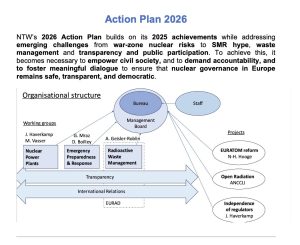
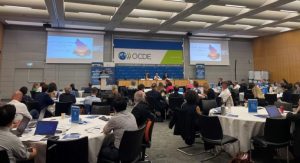
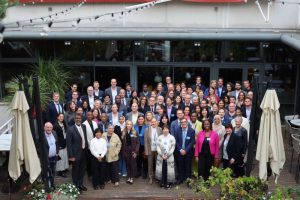
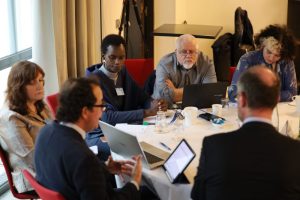
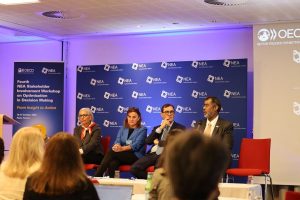
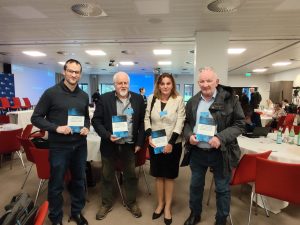
Tanja Perko, Nadja Zeleznik (NTW Chairwoman) and Peter Mihok (NTW member) have translated recent social science and humanities research (2020–2025) into evidence-based recommendations for policymakers managing societal aspects of radon and naturally occurring radioactive materials (NORM).
By bridging the gap between researchers and decision-makers, this work ensures that radon and NORM policies are informed by robust evidence, context-sensitive insights, and tested approaches.
Full paper -> Click here
#newpublication #scientificpaper #radon #NORM #SSH #policy #decisionmaking